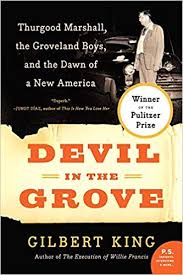Cruel Injustice

Gilbert King’s Devil in the Grove: Thurgood Marshall, the Groveland Boys, and the Dawn of a New America won the Pulitzer Prize in 2013. It’s an extraordinarily gripping and enraging historical account of racism, injustice, and hatred in Florida. I had trouble putting it down – it is that well-written and that upsetting.
The book charts a rape claim by a 17 year old white woman in Lake County, Florida, in 1949, and the horrific miscarriages of justice that resulted. The county sheriff, a violent and racist villain, arrested four young African-American men. They were tortured and evidence was fabricated – all while the Ku Klux Klan sought a lynching and was burning black-owned property and terrorizing the black community.
King balances that horrific narrative with the story of Thurgood Marshall, the NAACP, and the actions of the Legal Defense Fund to fight racism using the courts and the legal system. When Marshall did get involved, one of the arrested men had been already been shot “legally” while supposedly trying to escape. The other three were convicted through patently false claims and racism that was woven throughout the entire legal system. Marshall led the fight to get the convictions overturned. The Supreme Court ordered a new trial – but justice was far from served. The sheriff murdered one of the defendants and came very close to killing another in a faked escape attempt. The remaining two were convicted – again – and they served 12 and 19 years in prison.
Violence and racism faced Marshall, his team and the black community throughout. Harry Moore, who founded the NAACP branch in Broward County, Florida, worked heroically to support that wrongfully convicted men. Moore and his wife Marietta were killed in 1951 when their house was bombed. No one was every charged with their murder. In the 1980s, the bombing was linked to the Klan.
Devil in the Grove is not ancient history. It is recent – and an essential reminder about the pervasiveness of racism and the evil that it represents. Reading it leads to reflection and – if I can be optimistic – action to fight racism. It is haunting and a book that I very much recommend.
David Potash